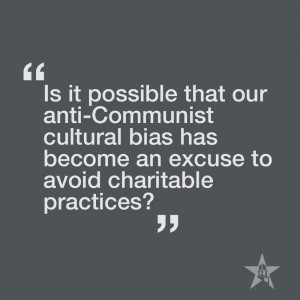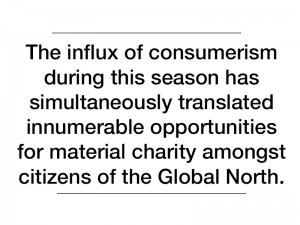A fear of all things red prevalent in our Western cultural mindset only continues to expound itself in our cultural practices, even as memories of the Cold War fade from the minds of our youngest generations. Popular entertainment pits our favourite Hollywood heroes and videogame characters against stock Russian supervillains. Historical figures from Marx himself to revolutionary Che Guevara are labelled and discarded by religious, educational, and state institutions. Even the most recent twitter trend #SochiProblems can be traced back to massive generalizations about countries that are politically unlike us in favour of an educated knowledge of their governmental systems and Christ-like interest in the wellbeing of their citizens.
 This inherent bias lashes out against anything our ‘red detectors’ might suspect, including (what should be considered) apolitical statements by Pope Francis about the inequalities present in many Western economic systems. In an apostolic exhortation entitled Evangelii Gaudium (“The Joy of the Gospel,” for those of us who don’t speak Latin), Pope Francis outlines in five chapters what he believes the evangelical goals of the Catholic Church ought to be.
This inherent bias lashes out against anything our ‘red detectors’ might suspect, including (what should be considered) apolitical statements by Pope Francis about the inequalities present in many Western economic systems. In an apostolic exhortation entitled Evangelii Gaudium (“The Joy of the Gospel,” for those of us who don’t speak Latin), Pope Francis outlines in five chapters what he believes the evangelical goals of the Catholic Church ought to be.
While my quick scan with the search bar dragged up the word ‘capitalism’ zero times in Evangelii Gaudium, it is evident that parts of the second chapter of the apostolic exhortation released in November of 2013 point directly at some of the glaring inequalities of free market systems. The Pope denounces “trickle down theories” that leave the poor sidelined, and claims that “a rejection of ethics and a rejection of God” are the primary causes of growing economic inequalities. The “new idolatry of money” finds us scrambling to consume and leaving those who can’t keep up behind us.
Read: Communism? “pure Marxism,” to quote Rush Limbaugh? Pope Francis is clearly not an economic theorist (nor does he claim to be), and the Evangelii Gaudium is not a political statement. It’s boldly Christian.
“I exhort you to generous solidarity and to the return of economics and finance to an ethical approach which favours human beings.” Let’s be honest. We live in a culture of overwhelming affluence and comfort. We also live in a culture in which we find homeless beggars on the street to be commonplace, and we are willing to literally kill each other over good sales (American Black Friday death tolls since 2006 amount to seven deaths and up to ninety injuries). Is it possible that our anti-Communist cultural bias has become an excuse to avoid charitable practices?
Those who denounce Pope Francis as a Communist or as simply too liberal for the Holy See are missing the point. Pope Francis’ statements centre on a Christian theological core: the desire for Catholics (and for all Christians, at that) to express love and concern for our neighbours. There’s nothing political, let alone Communist, about sharing wealth with the needy. This financial practice is one that was endorsed both by Jesus himself (Matthew 19:16-30) and practiced by the early believers (Acts 4:32-35).
Questions about the influence of liberation theology on the Argentinian pope have been raised, but especially for those of us outside of the realm of Catholicism it is difficult to judge the theological beliefs of another. Fair concerns about Pope Francis’ writings being viewed as sweepingly general (and primarily negative) towards wealthy people have also been voiced. It may well be that not all of us will agree with all of the Pope’s exhortations. Yet, as Christians, I think the message at the heart of Evangelii Gaudium’s second chapter is one that deserves our interest.

